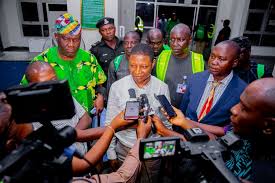Justice Inyang Ekwo of the Federal High Court, Abuja Wednesday faulted President Muhammadu Buhari’s appointment of 11 judges into the bench of the High Court of the Federal Capital Territory (FCT).
Justice Ekwo faulted the president’s action in a judgment on a suit seeking the stoppage of the appointments, saying Buhari violated Section 256(2) of the Constitution when he forwarded the recommended names sent to him by the National Judicial Council (NJC) to the Senate.
The judges were sworn in on September 14, 2020 by the Chief Justice of Nigeria (CJN), Justice Ibrahim Muhammad.
Delivering judgment in the suit filed by Oladimeji Ekengba, Ekwo said the only instance where the president can forward NJC’s recommendation to the Senate, in respect of a High Court judge’s appointment, is when it relates to the appointment of a head of court, like the Chief Judge.
The judge however held that the fact that President Buhari contravened the provision of Section 256(2) of the Constitution did not affect the swearing-in of the judges.
Among the new judges are: Abubakar Musa, Edward Okpe, B. Abubakar, M. Francis, Jude Nwabueze, Josephine Enobi, Christopher Opeyemi, Mohammed Idris, Hassan Aliyu, Fashola Adebowale and Hamza Muazu.
The defendants in the suit marked: FHC/ABJ/CS/733/2020, include; President Buhari, the Attorney General of the Federation (AGF), the Senate, the President of the Senate, the Clerk of the Senate, the CJN and the NJC.
Justice Ekwo said: “The issue is straightforward. It is whether the first defendant (the President of the Federal Republic of Nigeria) acted in compliance with the provision of Section 256(2) of the 1999 Constitution (as amended) to have sent the names of the 11 persons recommended for appointment as judges of the High Court of the Federal Capital Territory, Abuja to the Senate for confirmation.
“Looking at the provision of Section 256(2) of the 1999 Constitution (as amended), I find that there is no power or authority, express or implied, given to the first defendant (the President of the Federal Republic of Nigeria) to send names of persons recommended to him for appointment as judges to the Senate for screening,” he ruled.




